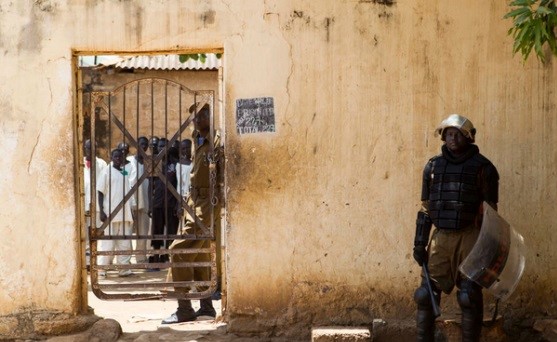UN photo
By
Amnesty International
South Sudan has carried out more executions this year than it has done in any other year since gaining independence in 2011, human rights NGO Amnesty International revealed in a new report showing a ‘disturbing’ escalation in the country’s use of the death sentence.
Amnesty’s report – ‘I told the judge I was 15’: The use of the death penalty in South Sudan’ –which is based on interviews with legal professionals and government officials working in the justice sector, shows that.
- since 2011, South Sudanese courts have sentenced at least 140 people to death and that at least 32 have been executed;
- a child was among seven people known to have been executed so far in 2018;
- a further 135 people are on death row and have been taken to two prisons notorious for carrying out executions;
- at least 342 people are currently on death row – including at least one child and a mother with a small child – which is more than double the number recorded in 2011.
Joan Nyanyuki, Amnesty International’s East Africa Director, said:
“It is extremely disturbing that the world’s youngest nation has embraced this outdated, inhuman practice and is executing people, even children, at a time when the rest of the world is abandoning this abhorrent punishment.
“The President of South Sudan must stop signing execution orders and end this obvious violation of the right to life.”
Children executed
Last year, South Sudanese authorities executed four people, two of whom were children at the time of their conviction.
Amnesty can confirm that between May and October 2018 at least one person who was a child at the time of the crime was executed, and that a 16-year-old boy is currently on death row at Juba Central Prison after being convicted of murder. Waiting for his appeal to be considered by the court, he described the crime as an accident:
“Before the accident, I was in secondary school. I was a runner, a very good one and I was also a singer of gospel and earthly songs. […] My own aim was to study and do things that can help others. My hope is to be out and to continue with my school,” he said, and added that he had told the judge that he was 15 during his trial.
The use of the death penalty against people below the age of 18 at the time of the crime is strictly prohibited under international human rights law and South Sudan’s 2011 Transitional Constitution.
Escalation of state-sanctioned killings
This year’s spate of state-sanctioned killings seems to have been sparked by a directive by the Director-General of South Sudan’s National Prison Service on 26 April. In this, the Director-General ordered all death row prisoners held at county and state prisons to be moved to two of the country’s most notorious prisons – Wau Central Prison and Juba Central Prison.
In May, 98 death row prisoners were transferred from Kuajok, Tonj, Rumbek and Aweil state prisons in Bahr el Ghazal region, in the north-western part of the country, to Wau Central Prison.
Another 37 death row prisoners, including at least one child and a breastfeeding mother, were also transferred from prisons in the Equatoria region in the south of the country to Juba Central Prison. Thirty-four people were moved from Torit State Prison in September 2018 and last month three from Kapoeta State Prison to Juba.
Death penalty in South Sudan
South Sudan’s penal code provides for the use of the death penalty for murder, bearing false witness resulting in an innocent person’s execution or for fabricating such evidence or using false evidence, terrorism (or banditry, insurgency or sabotage) resulting in death, aggravated drug trafficking, and treason.
Executions in South Sudan are carried out by hanging. Before a person sentenced to death can be executed, the Supreme Court and the President must confirm the death sentence.
Amnesty opposes the death penalty in all cases without exception regardless of the nature of the crime, the characteristics of the offender, or the method used by the state to execute the prisoner. The death penalty is the most fundamental denial of human rights. It violates the right to life as proclaimed in the Universal Declaration of Human Rights. It is the ultimate cruel, inhuman and degrading punishment.
Amnesty International is a non-governmental organisation focused on human rights with over 7 million members and supporters around the world. The stated objective of the organisation is “to conduct research and generate action to prevent and end grave abuses of human rights, and to demand justice for those whose rights have been violated.”



Why not be kind?